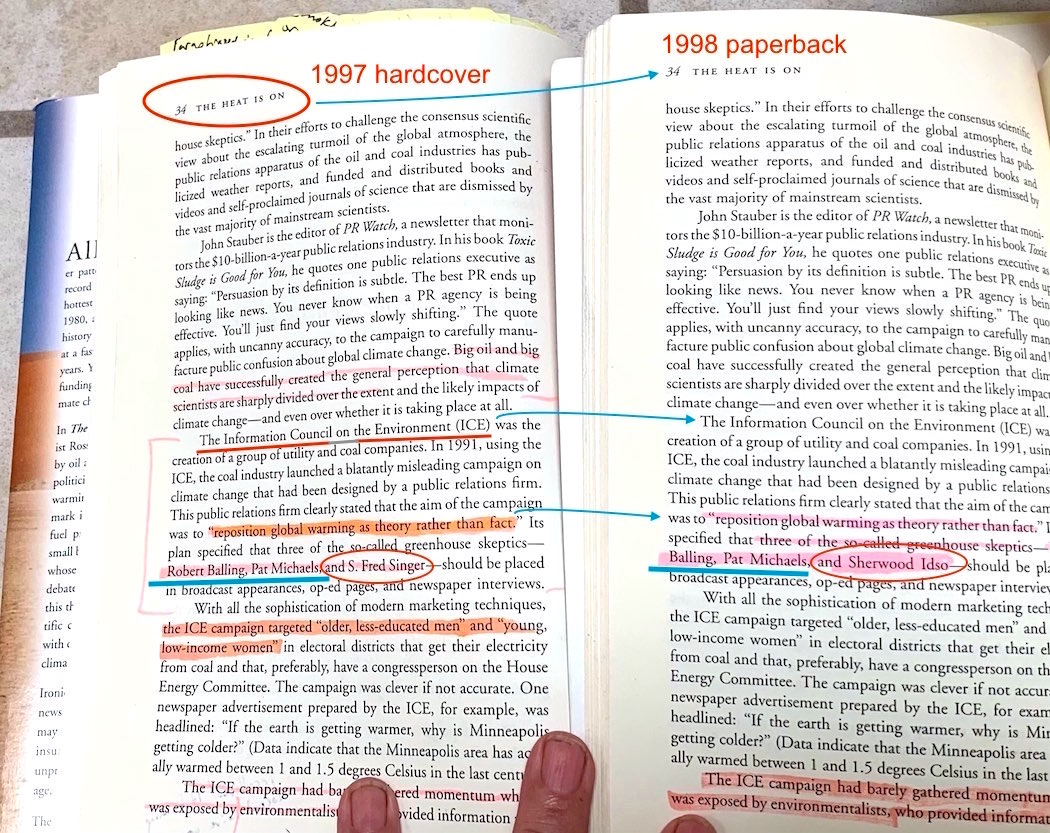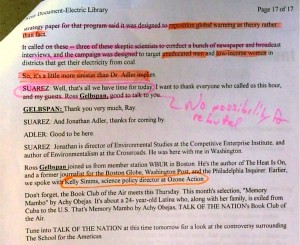Dive into science-based criticisms of man-caused global warming or the methods used to gather and assess evidence (or lack thereof) for it, and you are soon neck-deep in very complicated analysis about why the issue appears not to be settled. The accusation that skeptic scientists are paid to lie about the issue is not hard to follow at all, basic scrutiny of it reveals inconsistencies that only lead to more problems.
Let’s start with how Ross Gelbspan’s most widely repeated accusation line initially contained a famous skeptic name, Dr S. Fred Singer, which was later swapped for a different name without a word of explanation.
In general form, I detailed the faults in Gelbspan’s widely repeated accusation line in a December 2011 JunkScience.com article. Basically, Al Gore’s “An Inconvenient Truth” movie equated skeptic scientists with tobacco industry ‘science experts’ by literally spelling out a coal association’s PR campaign memo phrase “reposition global warming as a theory rather than fact” in comparison to an old tobacco company’s leaked internal document, “Doubt is our product“. Gore credits* Gelbspan for this, which was most widely seen first in Gelbspan’s “The Heat is On” book as follows,
The Information Council on the Environment (ICE) was the creation of a group of utility and coal companies, In 1991, using the ICE, the coal industry launched a blatantly misleading campaign on climate change that had been designed by a public relations firm. This public relations firm clearly stated that the aim of the campaign was to “reposition global warming as theory rather than fact”. Its plan specified that three of the so-called greenhouse skeptics – Robert Balling, Pat Michaels, and S. Fred Singer – should be placed in broadcast appearances, op-ed pages and newspaper interviews.
Unless you happen to have the slightly newer paperback version of the book, where it says on the same page 34,
The Information Council on the Environment (ICE) was the creation of a group of utility and coal companies, In 1991, using the ICE, the coal industry launched a blatantly misleading campaign on climate change that had been designed by a public relations firm. This public relations firm clearly stated that the aim of the campaign was to “reposition global warming as theory rather than fact”. Its plan specified that three of the so-called greenhouse skeptics – Robert Balling, Pat Michaels, and Sherwood Idso – should be placed in broadcast appearances, op-ed pages and newspaper interviews.
When you compare the text directly of the hardcover version and the paperback, it is word-for-word, line-by-line identical, except for the name change.

There is no explanation for the change in the paperback version. Not. One. Word.
Gelbspan’s assertion about the “sinister” intent of the fossil fuel industry, seen in a September 1997 “Talk of the Nation” NPR radio interview, is unmistakable.
Repetition of the accusation narrative from one influential speaker to the next as evidence of a large coordinated industry effort to ‘subvert science’ is very likely the reason why no less than the Vice Chair of the United Nations’ Intergovernmental Panel on Climate Change said in August 2011,
Mr. Fred Singer is a person whose scientific integrity leaves much to be desired. Its (sic) activities are financed disinformation by the lobbies of fossil fuels…
But do we not then have a major problem with that statement if Fred Singer had no involvement with the ICE campaign, the “evidence” that Gore and Gelbspan say is evidence of a sinister misinformation campaign? His name appears nowhere in the ICE memos.
This is not the only problem with Gelbspan’s pg 34 book narrative or his other related narratives. There are plenty of other questions to be raised about how the ICE memos ended up in Gelbspan’s and Gore’s hands, the apparently out-of-context characterization of them, what involvement Drs Michaels, Balling and Idso really had in the campaign, the actual extent of the campaign itself, on and on.
Gelbspan’s accusation narrative, and by default, Gore’s and others who repeat it, crumbles apart from every angle it is viewed. These crackups take on the appearance of a spreading cancer when anyone starts looking through them.
( * … well, even Gore’s claim on this cracks up, but I will devote other blog pieces to that wipeout later)

